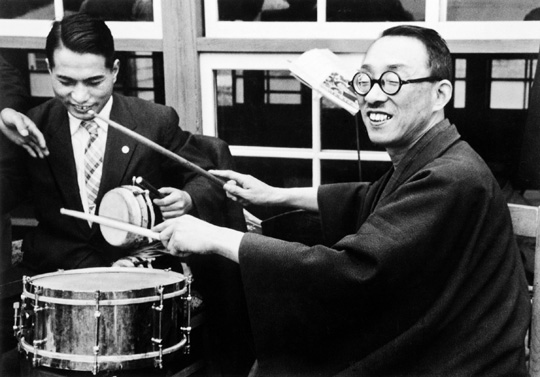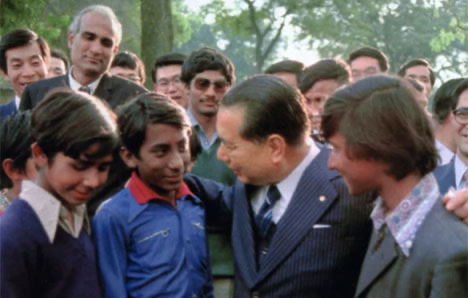Daisaku Ikeda (born on 2nd January 1928), is a peacebuilder, Buddhist philosopher, educator, author and poet. He is also an avid photographer with a particular love of scenic landscapes and natural beauty. As third president of the Soka Gakkai – a lay Buddhist organization in Japan, founding president of the Soka Gakkai International (SGI), and founder of several international institutions promoting peace, culture and education, he has dedicated himself to bolstering the foundations of a lasting culture of peace.
Biography

Daisaku Ikeda (left) with Josei Toda, 1956
Daisaku Ikeda was born in Tokyo, Japan, on January 2, 1928, to a family of seaweed farmers. He lived through the devastation of World War II as a teenager and witnessed its senseless horror, which left an indelible mark on his life. His four older brothers were drafted into military service and the eldest was killed in action. These experiences fuelled his lifelong quest and passion to work for peace and people’s happiness, tackling the underlying causes of human conflict.
In 1947, at the age of 19, he met his mentor and spiritual guide Josei Toda (1900–58), who was an educator and leader of the Soka Gakkai. Challenging poverty and ill health, he continued his education under the tutelage of Toda, who became his mentor in life.
In May 1960, two years after Toda’s death, Ikeda, then 32, succeeded him as the third President of the Soka Gakkai. He dedicated himself to encouraging the group’s members in their efforts toward personal transformation and societal contribution. Under his leadership, the movement began an era of innovation and expansion, fostering individuals committed to the promotion of peace, culture and education. On January 26, 1975, Ikeda founded the Soka Gakkai International (SGI), a global association formed to link independent Soka Gakkai organizations around the world.
PEACEBUILDER
For over 75 years since joining the Soka Gakkai (on August 24, 1947), Ikeda has promoted a culture of peace where differences are treasured and dialogue and exchange create bridges that link people’s hearts. He has taken concrete steps to rebuild friendships between Japan and its Asian neighbors.
Ikeda is a steadfast supporter of the ideals and potential of the United Nations (UN) and, every year since 1983, he has authored an annual peace proposal on January 26 to commemorate the founding of the SGI. These proposals present concrete solutions to a variety of global problems or threats that seriously impact people’s lives, livelihoods and dignity.
He has taken the lead in SGI’s grassroots activities promoting peace, human rights education, humanitarian relief, and education for sustainability. Today, SGI is a global organization of more than 12 million people in 192 countries and territories around the world.
He founded the Min-On Concert Association (1963) and the Tokyo Fuji Art Museum (1983) to deepen international understanding through musical and cultural exchange.
In 1993, he launched the Boston Research Center for the 21st Century, later renamed the Ikeda Center for Peace, Learning, and Dialogue, and in 1996, the Toda Institute for Global Peace and Policy Research, later renamed the Toda Peace Institute, which facilitates research on human security and global governance.
PROPONENT OF DIALOGUE

President Ikeda warmly meeting Nelson Mandela in Tokyo, Japan; October 1960
Dialogue, Ikeda asserts, reaffirms and reinvigorates our shared humanity. Ikeda is a staunch proponent of dialogue as the foundation of peace. Since the 1970s he has pursued dialogue with a wide range of individuals around the world in political, cultural, educational and academic fields. The number of formal encounters has been estimated at around 1,600.
70 of his dialogues have been published in book form. ‘Choose Life’, his dialogue with British historian Arnold Toynbee, whom he first met in 1972, has been published in 30 languages
He has met and engaged in dialogue with Nobel Peace Prize Laureates including Nelson Mandela, Linus Pauling, and Wangari Maathai, He had also held dialogues with eminent Indian Scholar Lokesh Chandra and Father of Green Revolution, Dr MS Swaminathan.
EDUCATOR

President Ikeda warmly meeting Nelson Mandela in Tokyo, Japan; October 1960
Ikeda believes that the task of education is to foster people of character who will contribute to building a just and peaceful world. He is also a firm believer in the importance of empowering young people.
He has put into practice the philosophy of Soka or “value-creating” education of Soka Gakkai founding president Tsunesaburo Makiguchi (1871-1944). This system of education, which is based on a belief in the limitless potential of every individual, includes Kindergartens, Soka schools and a Universities in Tokyo, Japan, and in Aliso Viejo, California, U.S.A.
He has delivered lectures on peace and human condition at more than 30 universities and academies worldwide, including Harvard University, the University of Bologna, the University of Havana and Peking University.
WRITER
Ikeda is a prolific writer and a poet who has published more than 250 works and his extensive publications encompass his ideas on various subjects in the form of dialogues, philosophical writings, essays, addresses, poetry, novels and children’s literature. Many of these works have been translated and published in various languages.
GLOBAL RECOGNITION
In recognition of his contributions as a peacebuilder and educator, Ikeda has been awarded more than 400 academic honors from universities in more than 50 countries and territories.
In India, he has been the recipient of 19 academic honors, including from the University of Delhi, Vishva Bharati University, Manav Rachna University, Xavier University Bhubaneswar, among several others.
He has been conferred the honorary citizenship by more than 800 cities, states and local governments from 29 countries and territories around the world.
Overall, Ikeda has been a recipient of over 4000 honors, awards and recognitions from various countries, institutes & organizations around the world.







